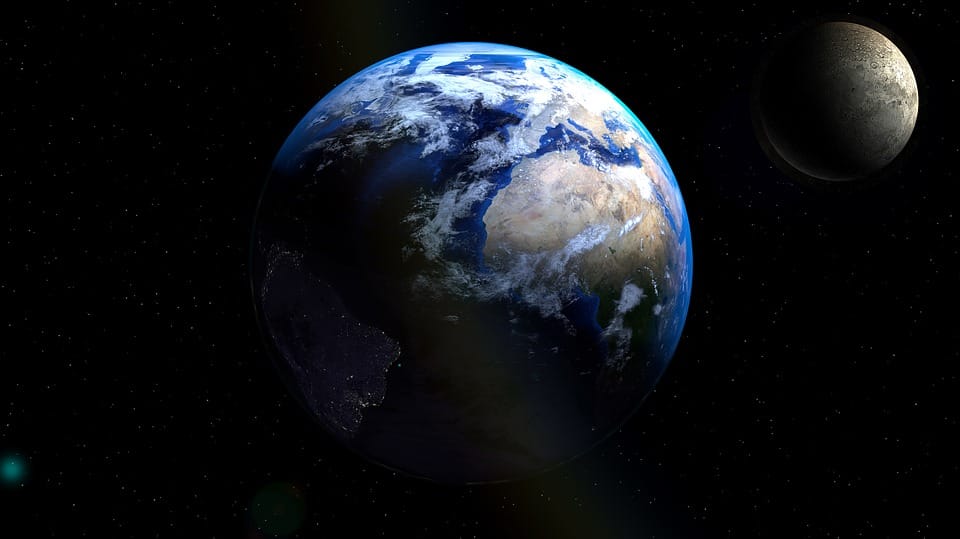There is an opinion that the rotation of our planet has accelerated in recent years. We decided to check whether this is so and what it threatens us with.
Many media outlets wrote that the Earth allegedly accelerated, for example, "Arguments and Facts", "Moscow 24", Buro 247, "News", The Telegraph and others. There is such information on many scientifically—popular portals. Social media users write about this: "VKontakte", Facebook, Twitter. Very popular topic the accelerated Earth in blogs on "Yandex.Zene".
Scientists thinkthat the so-called Big Bang not only created our planet, but also set its rotation. Since then it has continued by inertia - and will continue until something stops it. However, as with any inertia, the Earth's rotation speed gradually decreases. By studying fossil corals, scientists came to conclusion, that hundreds of millions of years ago, to make a revolution around the Sun, the Earth needed not 365 days, as it does now, but more than 400. That is, in a year it managed to turn around its axis several dozen times more, which means it rotated much faster, and over time it slowed down.
If we talk not about hundreds of millions of years, but about any foreseeable period, the speed of the Earth’s rotation, of course, will not change so noticeably. Strictly speaking, she is changing constantly, but the deviations are so small that they are completely invisible to an ordinary person. It takes our planet about 86,400 seconds to complete a revolution around its axis. But sometimes a little more, and sometimes a little less.
How do scientists understand that the Earth has sped up or slowed down?
There are several time scales, in particular, astronomical and atomic. Astronomical the system keeps time in accordance with the actual rotation of the Earth (this is the so-called “universal time” - UT1). UT1 is calculated by the angle of rotation of the Earth relative to quasars - one of the brightest objects in the visible Universe. Atomic The clock does not depend on any external conditions; it is a high-precision device that takes a certain number of changes in the state of an atom of a substance per second (the cesium-133 atom is taken as the standard). Exactly a second according to atomic clocks included to the International System of Units. The time in which a person lives in a particular time zone is determined through Coordinated Universal Time (UTC). For example, Moscow time is UTC+3, and New York time is UTC-5. And this time is also measured precisely by atomic clocks. Sometimes astronomical time does not coincide with atomic time - and scientists understand that the speed of the Earth has changed. The discrepancies are calculated in milliseconds, that is, a person without special equipment will not be able to notice it.

Experts from the Time and Date portal, dedicated to the study of time and time zones, wrote that 2020 was the shortest in the entire history of observations (it dates back to approximately the early 1960s). It was this year that there were the largest number of short days. Until 2020, the shortest day was July 5, 2005, when the Earth turned around its axis 1.05 milliseconds faster than the “standard” of 86,400 seconds. In 2020, there were as many as 28 days, which exceeded the 2005 figure, and the shortest was July 19, when 1.46 milliseconds “fell out” of the day. Even then it was predicted that 2021 will be even shorter, and it lived up to expectations, breaking the 2020 record: the Earth completed its required 365 revolutions 65 milliseconds faster than it should have. That is, just last year UT1 and UTC were out of sync by another 0.065 seconds.
Similar discrepancies happened and before - only the other way around, the atomic clocks went forward, and the Earth “lagged behind.” This is explained precisely by the fact that the rotation of our planet tends to slow down. When the total discrepancy approached 0.9 seconds, the atomic clock was calibrated: one leap second was added. Since the 1970s, this has happened every 2-3 years, but the last time the atomic clock was “translated” on New Year’s Eve from 2016 to 2017, and the additional seconds did not appear again. Now the trend has changed and, according to some researchers, if it continues, then by 2026 for the first time one second will not have to be added to UTC, but subtracted.
Why did the Earth accelerate its rotation, despite a completely logical tendency to slow down? Scientists identify several reasons. One of them is change climate, in particular, an increase in the temperature of the world's oceans and, as a consequence, the melting of glaciers. It was previously noted that in those years when the average temperature of the Earth increased noticeably, the speed of the planet’s rotation was also higher. Another possible reason put forward by NASA researchers is winds and severe storms. Affects on the speed of rotation of the Earth and the change in its distance to the Moon (and it is also constant is changing, although the last 500 million years have been quite slow - by a few centimeters per year).
Of course, this will not affect the daily life of an ordinary person in any way; most people will not even know about this missing second. But extra or “missing” seconds can cause serious problems. problems in those areas where precise time is required: astronomy, navigation, space flight, computer networks. This could even affect the performance of stock exchanges. If leap seconds have already been added before, then they have not yet had to be subtracted, and this causes some confusion among scientists. concerns — how a process that has not passed the tests, which will be carried out for the first time, will affect the operation of high-precision instruments and technologies. However, physicist from the University of Alberta (Canada) Mathieu Damberry offers do not panic, because he believes that the acceleration and deceleration of the Earth are cyclical processes, and sooner or later the planet’s rotation speed will return to the statistical average of 86,400 seconds.
Mostly true
Read on the topic:
- What is the atomic hour? How does the most accurate and obscure time measuring device work?
- Exact length of any day
- Was Giordano Bruno really burned for believing that the Earth was round and revolved around the Sun?
If you find a spelling or grammatical error, please let us know by highlighting the error text and clicking Ctrl+Enter.






